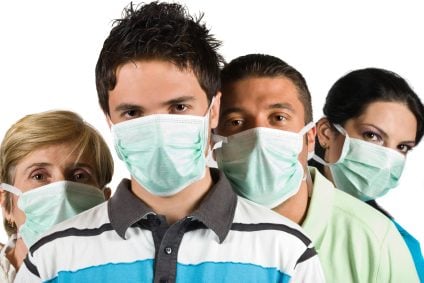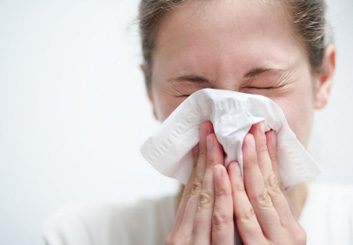
What’s your germ IQ?
You’ve probably been laid up with a cold or flu dozens of times in your life, but how much do you really know about the bugs that cause these illnesses?
“If I was not a medical person, I might not worry much about bacteria and viruses, I would probably lump all germs into one big category as ‘bad’,” says Dr. Brian Schwartz, director of Emergency Management Support for the Ontario Agency for Health Protection and Promotion. “But what they do is related to their microbiology, so it’s helpful knowing a bit more about them.”
Take our cold and flu quiz and test how much you really know about the germs that have plagued you all your life.

1. The common cold is caused by…
a) Viruses
b) Bacterial strains
c) Both

Answer: C
In more than 90 percent of cases, colds are caused by viruses. There are more than 200 viral strains that can cause the sniffles, including rhinovirus, coronaviruses and enteroviruses. On occasion, bacteria may be to blame, but only rarely.

2. The flu is caused by…
a) Viruses
b) Bacterial strains
c) Both

Answer: A
The flu is only caused by influenza viral strains. They change rapidly, and there are many different kinds, but all true flu infections are caused by one family of viruses.

3. Taking antibiotics for a cold or flu…
a) Is a good idea, just to be on the safe side.
b) Can’t do any harm, but probably won’t do any good.
c) Would probably do more harm than good.

Answer: C
If a virus to blame, antibiotics will be useless as they only kill bacteria. But to make matters worse, antibiotics will kill the “good” bacteria in your body as well as the “bad”, and you need the good bacteria to maintain your health. For example, the microbes in your gut help you digest food. When you get rid of these good guys with antibiotics, a nasty case of C. difficile can develop, leading to diarrhea and other intestinal issues.
What’s more, antibiotic-resistant bacteria, such as Methicillin-resistant Staphylococcus aureus (MRSA), are an increasingly dangerous threat to our health on a global level-especially in the hospitals where they breed. Antibiotic-resistant strains are extremely difficult to treat, and the more antibiotics we use for everything else, the more resistant strains develop.
“We have become stuck in a cat-and-mouse game-we come up with stronger antibiotics, but then we just create new problems,” Schwartz explains. “Bacteria can adapt rapidly. And some of the new strains we’re seeing around the world are really scary.”

4. If I get a cold, my chances of getting it again are…
a) Slim to none.
b) Medium, I might only get it again if I’m unlucky.
c) High-I’m almost certain to get it again.

Answer: A
Once you get a cold, you probably won’t have to suffer through it again. “You will acquire an immunity to a virus once you have come into contact with it, and in fact, we develop immunity to every infectious agent we come across,” says Schwartz. Your clever immune system stores a “library” of information on the viral strains with which you come into contact, so it knows how to fight them next time. But the reason we keep getting colds year after year, says Schwartz, is because there are hundreds of different viruses that can cause a cold-and each one is capable of mutating into something new.

5. I am more likely to get a cold in the winter because…
a) The viruses thrive in cold temperatures.
b) Colder temperatures make my body more vulnerable.
c) I’m spending less time outside in the fresh air.

Answer: C
There is no evidence that cold temperatures make you more likely to get sick-even going outside won’t make you more vulnerable to viruses. So why do people get sick more often in the winter? “The most likely explanation is we are spending more time inside around other people, increasing the chances of transmission,” says Schwartz.

6. I can catch a cold virus from somebody else…
a) Just by being in the same room as them.
b) Even by being in a room that they have just been in.
c) Only by sharing a drink, or touching something they have touched.

Answer: C
“Cold viruses are not airborne. The [viruses] that are, like chickenpox or measles, are far more contagious,” says Schwartz. Cold viruses, on the other hand, are spread through water droplets, and you can easily be in the same room as someone who has a cold and not catch the virus from them. “In order to get a cold, you need a direct line of contact between [a sick person’s] mouth and nose and your mouth and nose,” he explains. So stick to common sense: wash your hands, disinfect surfaces, and keep a metre’s distance between yourself and Mr. Sniffles.

7. If I get the flu shot…
a) I cannot get the flu.
b) I might get the flu anyways.
c) I could actually get the flu from the shot itself.

Answer: B
Flu shots contain dead viruses, so there is no chance of contracting the flu from the actual shot itself. But just because you’ve had the shot doesn’t mean it’s absolutely guaranteed to work-there is a small chance that you might come into contact with a flu strain that is different from the ones in this season’s shot. You’re also still vulnerable to flu virus strains that are in the shot for up to two weeks after you receive the vaccine. “The shot itself doesn’t lead to full immunity for up to two weeks,” says Schwartz. “People need to understand that the influenza shot is never going to completely prevent the flu-but it can significantly reduce your chances of getting it.”

8. If I’ve had the flu shot, I might still get stomach flu because…
a) The shot may not have worked.
b) The shot may not have contained the right influenza strain.
c) The flu shot does not protect against stomach flu.

Answer: C
The influenza virus does not cause “stomach flu”-this is purely a misnomer. The actual name for this illness is gastroenteritis. “Vomiting and diarrhea are usually caused by noroviruses, another kind of virus, or a bacterial intestinal infection,” says Schwartz.

9. If I do get sick this year…
a) I can go to work as long as I feel fine-others aren’t too likely to catch it as long as I’m careful.
b) I should see a doctor immediately.
c) I should stay at home and avoid other people as much as possible.

Answer: C
For many of us, the flu presents more of an inconvenience than a real threat to our health. But for some people, such as the elderly, the flu can be life-threatening. So we need to do everything we can to avoid spreading the flu around, and that may include resisting the urge to visit your doctor. There isn’t much a doctor can do to treat a non-serious flu, so unless your condition become serious, you’ll do other patients (some of whom might have compromised immune systems) a favour by riding out your symptoms at home.
However, if your doctor is a member of the Canadian Primary Care Sentinel Surveillance Network, you may offer to let them take a throat swab to help medical researchers and epidemiologists keep tabs on what is going around. “On a population basis, it is important for us to know what germs are circulating,” says Schwartz.

10. If I’m suffering from aches and pains while I have a cold or flu…
a) It is a sign of acute infection and I need to see a doctor.
b) I simply need more rest.
c) It’s a good sign.

Answer: C
Sore muscles are simply a sign that your body is fighting back against a virus, says Schwartz. Running a fever is also your body’s way of getting better, as high temperatures mean your body is killing the virus. This is especially true for healthy young people, he adds, as they have highly reactive immune systems. Feeling rotten while you’re battling a cold or flu has more to do with your body’s reaction to the virus than with the virus itself.
Related:
• 4 foods to beat cold and flu symptoms
• 5 surprising secrets of people who never get sick
• 5 health symptoms you should never ignore
